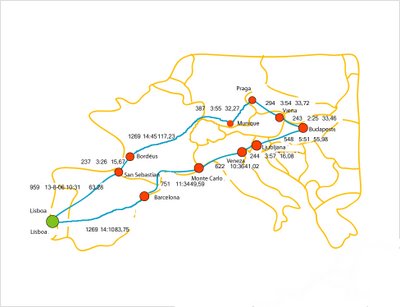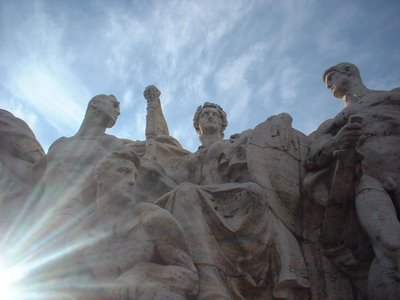(*e fica sempre a ideia no ar, de que nao percebo porque so alguns conflitos - nao necessariamente os mais graves, os mais perto, os mais "nossos", os mais "importantes" - tem direito a tempo de antena)
Crisis watch n°36, 1 August 2006
July 2006 was the grimmest month for conflict prevention around the world in three years. In 36 months of publishing Crisis Watch, the International Crisis Group has not recorded such severe deteriorations in so many conflict situations as in the past month, and several have significant regional and global implications.
The Middle East erupted with full-scale conflict between Israel and Hizbollah in south Lebanon, and there was a major escalation in Israel’s conflict with Hamas in Gaza – both fronts threatening further regional destabilisation. Insecurity and sectarian violence surged in Iraq, claiming over 100 civilian lives daily, as the U.S. military reported a 40% increase in major attacks in Baghdad.
The Horn of Africa also showed ominous signs of breakdown. Somalia sits on the brink of all-out civil war, which is drawing in the wider region: Ethiopian troops entered Somalia to support the transitional federal government, and Eritrea is arming the opposing Union of Islamic Courts. In Sudan, implementation of the Darfur Peace Agreement was at a standstill, with rebels split, and fighting, over the agreement.
In South Asia, the 11 July Mumbai bombings that killed over 200 had wider implications for the normalisation process between India and Pakistan, with New Delhi accusing Islamabad of being soft on terrorism. Sri Lankan government troops launched a ground assault on the Liberation Tigers of Tamil Eelam (LTTE) after four days of air strikes, considered by the LTTE to be an “act of war”.
Tensions rose dramatically on the Korean Peninsula after Pyongyang fired seven test missiles, which received unanimous condemnation from the global community. The situation also deteriorated in Colombia, Côte d’Ivoire and Haiti.
Four situations showed improvement in July 2006. The Democratic Republic of Congo held its first elections in 40 years. The Angolan government signed a ceasefire agreement with Cabindan separatists. Timor-Leste showed signs of stabilisation after the April/May violence. And in a surprise move, Greek and Turkish Cypriot leaders agreed to launch a confidence-building process.
For August 2006, CrisisWatch identifies Israel/Occupied Territories, Lebanon, Somalia and Sri Lanka as Conflict Risk Alerts. Conflict Resolution Opportunities are identified in Uganda and the Basque Country.
TRENDS AND WATCHLIST SUMMARY
JULY 2006 TRENDS
Deteriorated Situations
Colombia, Côte d’Ivoire, Haiti, India (non-Kashmir), Iraq, Israel/Occupied Territories, Kashmir, Lebanon, North Korea, Somalia, Sri Lanka, Sudan
Improved Situations
Angola, Cyprus, DR Congo, Timor-Leste
Unchanged Situations
Afghanistan, Albania, Algeria, Armenia, Azerbaijan, Bahrain, Bangladesh, Basque Country (Spain), Belarus, Bolivia, Bosnia & Herzegovina, Burundi, Central African Republic, Chad, Chechnya (Russia), Egypt, Ethiopia, Ethiopia/Eritrea, Georgia, Guinea, Guyana, Indonesia, Iran, Kazakhstan, Kosovo, Kyrgyzstan, Liberia, Macedonia, Maldives, Mali, Mauritania, Mexico, Moldova, Montenegro, Myanmar/Burma, Nagorno-Karabakh (Azerbaijan), Nepal, Nigeria, North Caucasus (non-Chechnya), Northern Ireland (UK), Pakistan, Philippines, Peru, Rwanda, Serbia, Sierra Leone, Solomon Islands, Somaliland (Somalia), Syria, Taiwan Strait, Tajikistan, Thailand, Turkey, Turkmenistan, Uganda, Ukraine, Uzbekistan, Venezuela, Western Sahara, Yemen, Zimbabwe
AUGUST 2006 WATCHLIST
Conflict Risk Alerts
Israel/Occupied Territories, Lebanon, Somalia, Sri Lanka
Conflict Resolution OpportunitiesBasque Country (Spain), Uganda
* NOTE: CrisisWatch indicators - up and down arrows, conflict risk alerts, and conflict resolution opportunities - are intended to reflect changes within countries or situations from month to month, not comparisons between countries. For example, no "conflict risk alert" is given for a country where violence has been occurring and is expected to continue in the coming month: such an indicator is given only where new or significantly escalated violence is feared.


